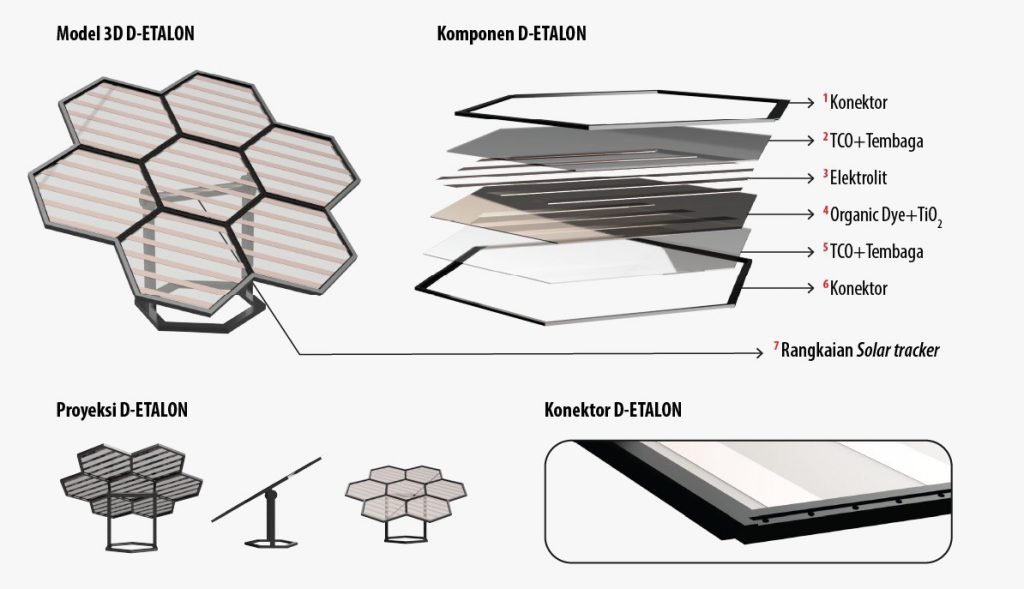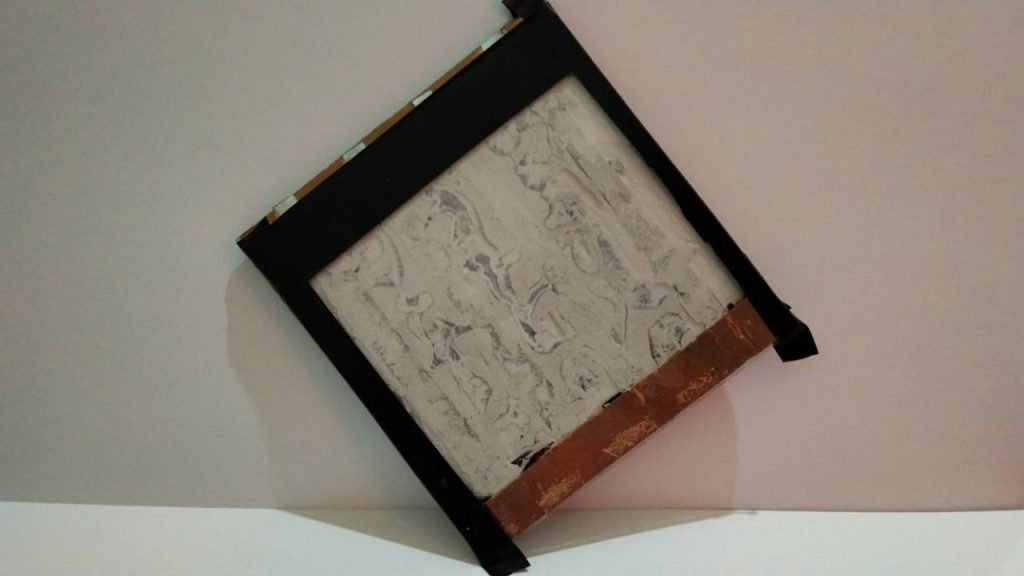ITS Students Develop Solar Panels for 3T Areas

3D Shapes, structures, and D-ETALON components that show their layers
ITS Campus, ITS News – The distribution process and lack of efficient energy sources are factors in the difficulty of electricity entering the 3T area (lagging, leading, outermost) in Indonesia. 433’s villages have not been supplying with electricity. From this problem, four students of Institut Teknologi Sepuluh Nopember (ITS) managed to assemble an environmentally friendly portable solar panel.
The product is called Dye-Sensitized Smartphone Waste Environmental Solar Panel or can be called D-ETALON. This product was developing by four students of the Department of Industrial and System Engineering, namely Hammam Dhiyaurrahman Yusdin, Hanif Sri Subaga Alim, Kevin Surija, and Ahmad Aulia Zakiyal Fikri. They intend to reach the 3T area with innovations with a portable and modular design (assemblies) so that it can be utilized by the community there.

(from left) Ahmad Aulia Zakiyal Fikri, Hammam Dhiyaurrahman Yusdin, Kevin Surija, dan Hanif Sri Subaga Alim, who developed D-ETALON inovation
Hammam Dhiyaurrahman Yusdin, one of the team members, explained that the D-ETALON component has several layers made from environmentally friendly raw materials such as plants. One of them is the rosella flower. Then, this rosella flower will be added titanium dioxide (TiO2) to be a kind of liquid (paste). “Its function is to improve the efficiency of this D-ETALON,” said Hammam.
Besides, he continued, other layers make use of smartphone waste or other electronic devices. Like the second layer, the transparent Transparent Conducting Oxide (TCO) section that can conduct electricity makes use of the outermost layer of the smartphone or LCD screen. While the third layer or electrolyte comes from zinc which is also a waste of electronic devices. “The function is the same, too, to improve efficiency,” continued Hammam.
Furthermore, Hammam said, the portable and modular design of D-ETALON will make it easier for users to take advantage of this product. “Our goal is to use this design to be easily distributed,” said the Gresik-born student. The product is not too big, and the design that supports this becomes a solution for 3T areas that have a difficult distribution path.
Hammam admits solar cell products that use organic materials are not as efficient as solar panels in general. However, he and his team outsmarted this with a plastic recycled connector system that connects one D-ETALON with another. Proven this product is six times more efficient than other organic solar cells

The initial prototype of D-ETALON in accordance with the initial design of the research to test the efficiency
Innovation that can provide solutions to electrical problems in the 3T area and develop this environmentally friendly product has led the team to be the winner at the ASEAN Innovative and Entrepreneur Fair (AISEEF) 2021 competition, last February. They won gold medals in the Environmental Science category.
Hammam added that this innovation was included in this year’s Student Creativity Program (PKM). “We also added a feature that is Solar Tracking System,” he added. This system will make the solar panel follow the direction of the sun according to its movement from sunrise to sunset so that the output is more maximized.
Later, Hammam said, there will also be a light sensor integrated with Arduino, a software-based micro-control. “So that solar panels can move in the direction of the sun,” he explained.
Besides, being able to participate in various other competitions, the target of Hammam and his team is so that this innovation can be brought to the National Student Scientific Week (Pimnas) and achieve victory. Hammam hopes this D-ETALON product can be used directly by the community. “In PKM later, we also plan to deliver this (D-ETALON product, red) to the community, perhaps like the 3T area in Madura and its surroundings,” concluded Hammam. (pan/ITS PUBLIC RELATIONS)
Reporter: ion20
Related News
-
ITS Wins 2024 Project Implementation Award for Commitment to Gender Implementation
ITS Campus, ITS News —Not only technology-oriented, Institut Teknologi Sepuluh Nopember (ITS) also show its commitment to support gender
March 16, 2021 15:03 -
ITS Professor Researched the Role of Human Integration in Sustainable Architecture
ITS Campus, ITS News –The developing era has an impact on many aspects of life, including in the field
March 16, 2021 15:03 -
ITS Sends Off Group for Joint Homecoming to 64 Destination Areas
ITS Campus, ITS News — Approaching Eid al-Fitr, the Sepuluh Nopember Institute of Technology (ITS) is once again facilitating academics who want
March 16, 2021 15:03 -
ITS Expert: IHSG Decline Has Significant Impact on Indonesian Economy
ITS Campus, ITS News — The decline in the Composite Stock Price Index (IHSG) by five percent on March 18,
March 16, 2021 15:03
